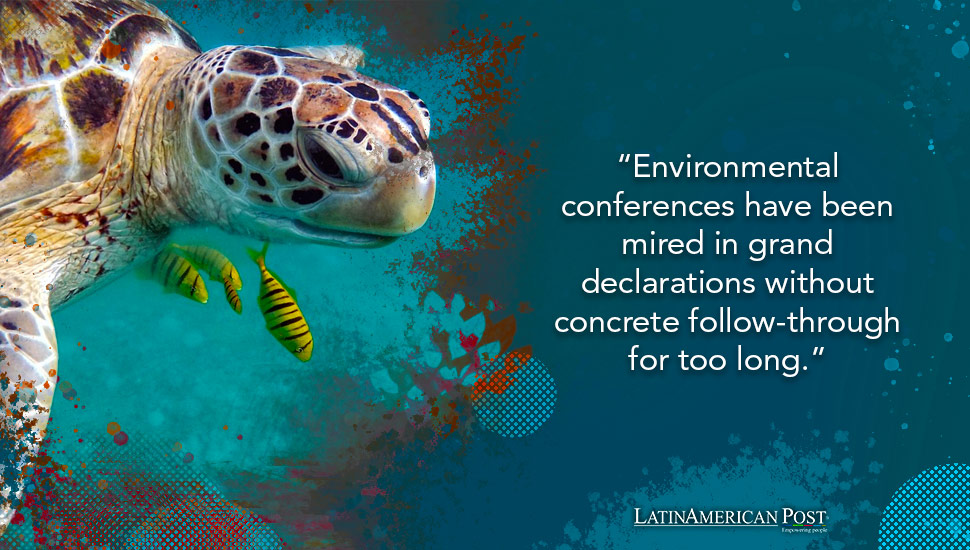Action Plan Needed for Marine Turtle Conservation Efforts During Ecuador COP11

The ongoing COP11 meeting in Ecuador highlights the need for concrete action plans and measurable goals in marine turtle conservation, moving beyond mere discussions to ensure real progress and protection for these essential species.
Representatives from fifteen American countries gathered in Ecuador for the eleventh meeting of the Conference of the Parties (COP11) of the Inter-American Convention for the Protection and Conservation of Sea Turtles (CIT). This assembly, a crucial platform for regional cooperation and policy-making, aims to conduct a comprehensive situational analysis of marine turtles to devise strategic plans for their conservation. While the intentions are commendable, the meeting must have specific, actionable goals and measurable performance indicators to ensure tangible outcomes.
Ecuador’s Minister of Environment, Water, and Ecological Transition, Sade Fritschi, inaugurated the event, emphasizing the need for a “situational diagnosis” based on reports from government representatives and CIT members. The meeting also aims to gather scientific insights and input from academia and other sectors involved in political, social, and economic initiatives. However, with specific conclusion goals and performance measurements, these discussions avoid becoming an exercise in rhetoric rather than action.
Environmental conferences have been mired in grand declarations without concrete follow-through for too long. The importance of marine turtles to ecological balance is undisputed—they are vital to the health of aquatic ecosystems, playing critical roles in nutrient cycling and maintaining the health of seagrass beds and coral reefs. Yet, despite their recognized importance, conservation efforts often fall short due to a lack of actionable objectives and accountability mechanisms. The current state of marine turtle conservation is a race against time, with these majestic creatures teetering on the brink of extinction.
The Need for Concrete Goals
Minister Fritschi’s remarks about marine turtles’ historical and ecological significance underscore the urgency of effective conservation measures. She highlighted Ecuador’s pioneering role in Latin America, identifying twelve nesting beaches within the national protected areas system. This is a commendable effort, but to truly protect marine turtles, we must move from recognizing the problem to implementing solutions with clear, measurable targets. The benefits of successful conservation are immense, including the preservation of biodiversity, the protection of key ecosystems, and the promotion of sustainable tourism.
For instance, the conference should set specific goals for reducing bycatch in fishing operations, one of the leading causes of marine turtle mortality. This could include implementing more rigorous monitoring and enforcement of fishing regulations, promoting the use of turtle-excluder devices, and establishing bycatch reduction targets with timelines. Similarly, goals should be established for habitat restoration, such as the number of kilometers of nesting beaches to be rehabilitated or the extent of protected marine areas to be expanded. These measures are crucial as marine turtles face a multitude of threats, including habitat loss, pollution, climate change, and illegal trade.
Measuring Performance and Accountability
Establishing performance measurement frameworks is crucial to ensuring the effectiveness of conservation efforts. These frameworks should include regular monitoring and reporting mechanisms to track progress towards the conference goals. For example, annual reports on the status of marine turtle populations, the success rate of nesting sites, and the reduction in threats such as poaching and bycatch would provide valuable data to assess the effectiveness of conservation strategies. To achieve these goals, it is essential to invest in capacity building, strengthen enforcement of existing regulations, and promote public awareness and participation in marine turtle conservation.
Moreover, these performance metrics should be publicly available to enhance transparency and accountability. To ensure a comprehensive and inclusive approach, stakeholders, including local communities, NGOs, and international organizations, must be actively involved in the monitoring process. Your individual contribution can make a significant difference in this collaborative effort, improving the data’s credibility and fostering a sense of shared responsibility in marine turtle conservation.
Leveraging Regional and International Cooperation
The participation of various countries and organizations in COP11 presents an excellent opportunity to leverage regional and international cooperation for marine turtle conservation. Verónica Cascante, the CIT Secretary, highlighted the upcoming World Sea Turtle Day on June 16 and urged reflection on the achievements and ongoing efforts to protect these species. The conference in Manta offers a platform to share best practices, align conservation strategies, and mobilize resources for more impactful actions.
Ecuador’s efforts, supported by organizations like the German Cooperation Agency (GIZ), Wildlife Conservation Society (WCS), Conservation International (CI), WildAid, and The Nature Conservancy (TNC), demonstrate the potential of collaborative efforts. These successful collaborations can be translated into concrete actions with defined outcomes. For example, joint initiatives could focus on creating a network of protected areas across national boundaries, enhancing marine turtle populations’ genetic diversity and resilience.
Turning Talk into Action
While the COP11 meeting in Ecuador is a step in the right direction, it must go beyond discussions to establish specific conclusion goals and performance measurements. By setting concrete targets, creating robust monitoring frameworks, and fostering regional cooperation, we can ensure that conservation efforts lead to meaningful and lasting outcomes for marine turtles. The time for mere talk has passed; it is now imperative to turn words into action to protect these ancient guardians of the ocean and preserve the delicate ecological balance they support.
Also read: Exploring the Richness of Volcanism: Ecuador and Canary Islands Under the Lens





